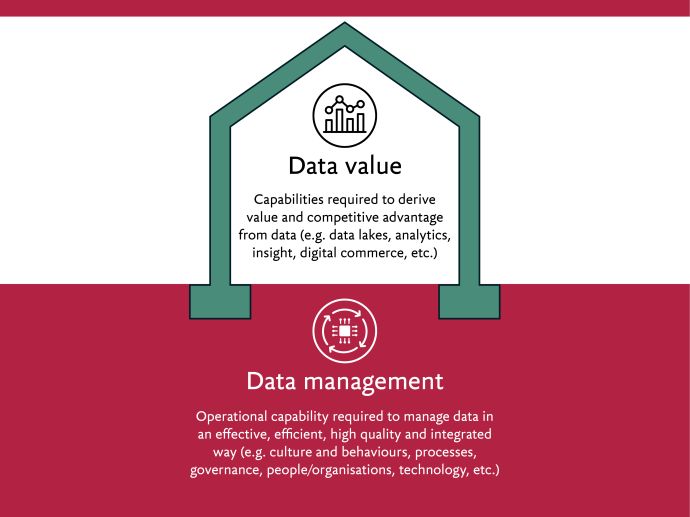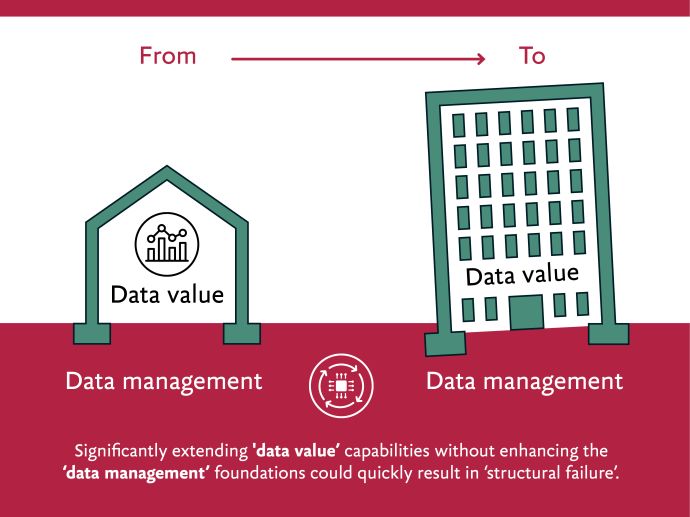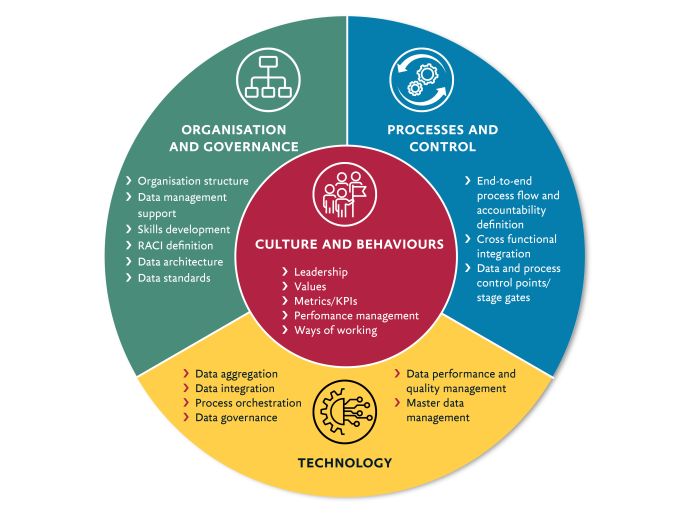In this article, we explore the key changes that businesses need to make to effectively and efficiently harness the full value of their data. Set up for continued success with the right data management foundations.
The data management problem undermining the data value opportunity
Data has always been important. But driven to a large extent by the demands of digital transformation, businesses now need to manage data that has grown dramatically in volume, scope, distribution and complexity – as well as in its strategic value and operational criticality.
Many businesses recognise data's fast-growing importance and have invested heavily in data value capabilities – such as data lakes, analytics and digital commerce – to help gain competitive advantage.
However, many organisations find they lack a fundamental prerequisite to success: data management capability. Often only after making the significant investments above, these organisations discover they can't manage information across the business effectively and efficiently or ensure integration and quality.

This prevents organisations from delivering data with the timeliness, quality, integrity and granularity needed to exploit their data value capabilities.
It can also create major operational issues. Businesses may struggle to cope with significant growth in the volume, complexity and criticality of data, as well as in the channels through which data must be consistently communicated, distributed and used.

But what is the solution to this problem?
Once the preserve of only operations engineers and data management specialists, this question has driven board-level conversations in many of our clients' organisations. All of them have been long-established leaders in very different sectors, and all have been excited about the strategic opportunities which data could unlock for them. But they're all rightly examining how they will be able to adapt quickly enough to build the data management capability required to compete and win in a data-driven world.
Good data management goes beyond technology
Too often, the data management problem is left with the CIO to solve in the first instance.
Technology is certainly part of the solution, but data is an asset which is created, sourced and used by the business – so it is first and foremost the business who must take accountability for its quality, integrity and security.
To ensure data works for your business rather than against it, you typically need change in four key areas.

Data management starts with the right culture, behaviours and values
Everyone in the organisation should place the quality and integrity of data at the heart of everything they do.
The right behaviours tend to be deeply ingrained in 'digitally native' businesses such as digital media agencies, which have been powered by data since their inception. They can be more challenging to embed in long established organisations with a more traditional heritage, where the role and importance of data has grown so quickly and suddenly.
To create the conditions for success, the right tone must be set from the top. This must be underpinned both by strong change management and by performance metrics and management to motivate and positively reinforce the right ways of working.
The right culture, behaviours and values are a vital foundation for all the other interventions below. It is crucial that the change journey starts here.
Adapt your organisational structure and develop the right governance over data
A frequent mistake is to try to hand off the data management problem to a data management team or outsourcer to 'fix' on behalf of the business. The reality is that this is not a problem that can be neatly packaged up and given to someone else to solve.
Everyone involved in creating and sourcing data must take responsibility for its quality and integrity – and given the increasingly intrinsic nature of data, this means that most people in the organisation will have some role to play. Trying to 'give the problem away' can undermine the sense of ownership and responsibility which is so essential to success.
However, adapting the organisational structure and deploying additional resources to support and enable the business to take on its responsibilities is crucial. Key roles may include:
- Maintaining clarity on processes, responsibilities and data management metrics
- Maintaining and overseeing the application of data architecture and data standards to facilitate data integrity and integration, as well as information security standards to protect data from unauthorised use
- Managing, deploying and ensuring consistent use of structural master data (and master data mapping, where necessary) across the business
- Ensuring that people throughout the business have the skills needed to manage data effectively.
Having the right governance in place to ensure the business holds itself to account for sustaining and continuously improving the security, quality, integration and integrity of its data assets is also key.
End-to-end data processes and controls across the business
An organisation's most important data entities are typically assembled and reused across the enterprise, rather than being the sole preserve of individual functions.
Take product data within an FMCG business. R&D, marketing, supply chain and many other functions all need to contribute data and content at various points in the process to build up a complete and accurate record for each product, which can be reused consistently and with confidence by all.
Clear, integrated processes, accountabilities and control points, which cut across functional silos and extend end-to-end, are vital. This will not only safeguard data quality and integrity – but also ensure operational execution remains fast, responsive and efficient.
Extend your technology investment to all areas of data management
If the journey starts with the right culture and behaviours, it ends with the right technology.
Technology is too often thought of as the first step or even as a panacea. It's not. Too many businesses start their journey by investing in expensive data management solutions to find that all they've succeeded in doing is ramp up the production and distribution of bad data. Worse still, by distributing this data from a shiny new system, they create a misplaced confidence in its quality.
When the time is right to invest in technology, it's important not to limit its use to data integration and aggregation. Technology can play a vital role in enabling the people and process changes already mentioned above. It should be extended into areas such as process orchestration, data governance, data performance management and data quality management.
Recognise and respond in time to the data challenge and opportunity
Many organisations will need to fundamentally change their approach to managing data to benefit from its value. As many have learned the hard way, this a challenge at the heart of the business and not something which can be addressed through technology and outsourcing on their own.
Those organisations which respond in time will be successful in harnessing data to power their businesses into the future. For those that leave it too late, data's growing importance, volume and complexity could paralyse and leave them behind.
The content of this article is intended to provide a general guide to the subject matter. Specialist advice should be sought about your specific circumstances.
